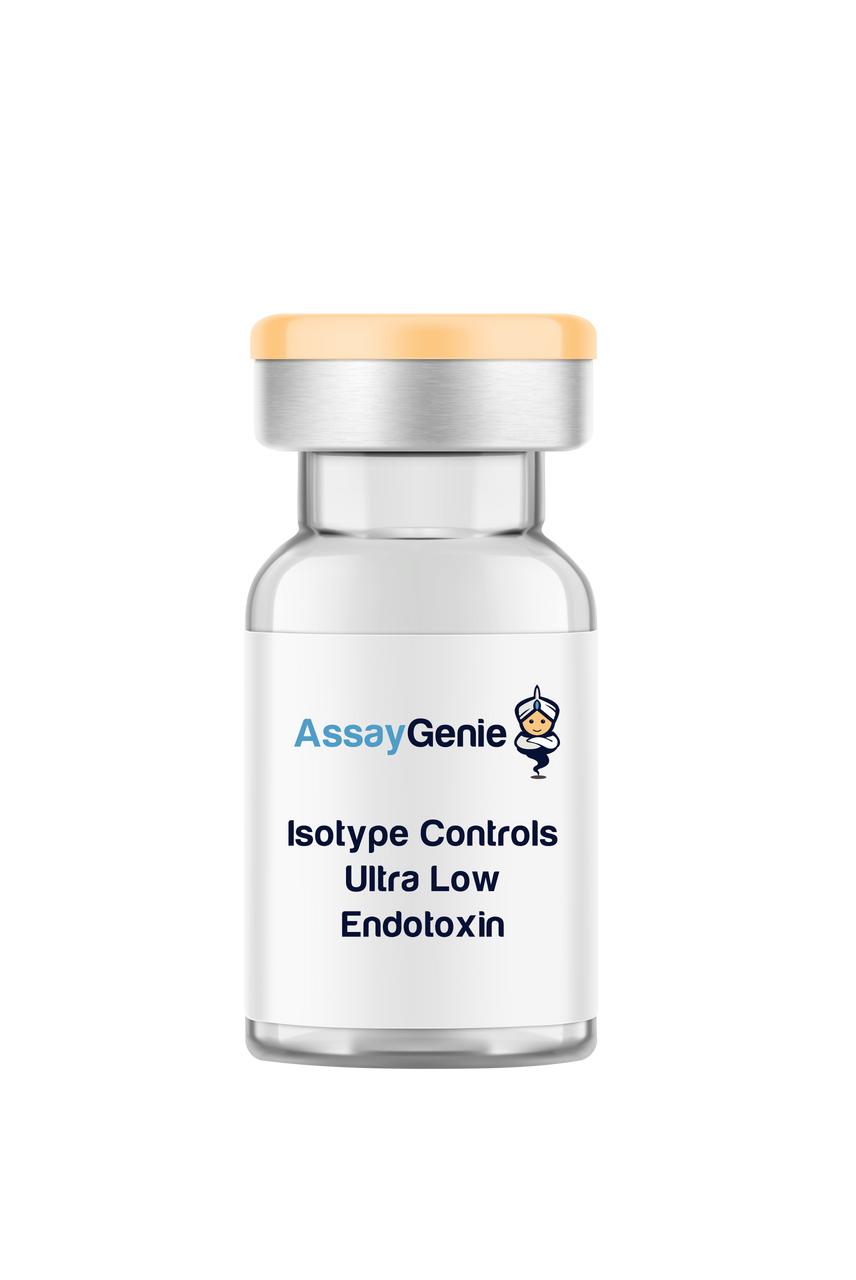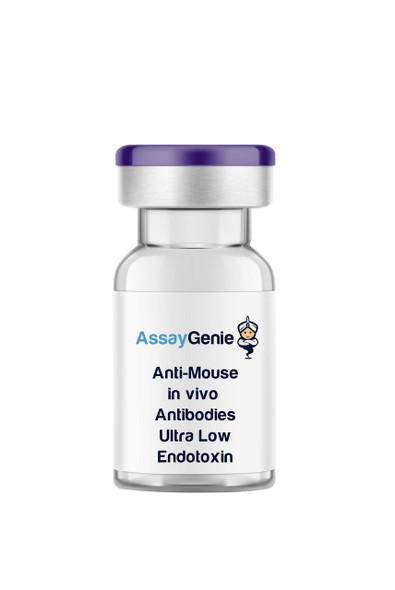Anti-Mouse CD86 In Vivo Antibody - Ultra Low Endotoxin (IVMB0157)
- SKU:
- IVMB0157
- Antibody Type:
- Functional-Grade In Vivo Antibody
- Applications:
- In Vivo
- Disease Area:
- Cancer
- Clone:
- GL1
- Protein:
- B7-2
- Isotype:
- Rat IgG2a kappa
- Reactivity:
- Mouse
- Synonyms:
- B7-2
- B70
- Ly-58
- CD-86
- Research Area:
- Immune Checkpoint & Cancer Biology
- Endotoxin Level:
- Ultra Low Endotoxin
- Host Species:
- Rat
- Blocking
- ELISA
- WB
Description
Anti-Mouse CD86 In Vivo Antibody - Ultra Low Endotoxin
Introducing the Anti-Mouse CD86 In Vivo Antibody - Ultra Low Endotoxin from Assay Genie, a highly specific monoclonal antibody expertly crafted for in vivo applications. This antibody targets the CD86 protein, a critical co-stimulatory molecule in T-cell activation and immune responses, making it invaluable for research in immunology and related fields. With a rat IgG2a isotype, it guarantees high purity and ultra-low endotoxin levels (<0.01 EU/μg), making it perfect for flow cytometry, ELISA, immunoprecipitation, and other assays.
Available in various sizes, it is formulated in phosphate-buffered saline for enhanced stability and efficacy. CD86 is predominantly expressed on antigen-presenting cells such as dendritic cells, macrophages, and B-cells. It plays a significant role in providing necessary signals for the survival, proliferation, and differentiation of T-cells. Enhance your research with the reliability and versatility of the anti-mouse CD86 in vivo antibody, designed to deliver consistent and reproducible results.
| Product Name: | Anti-Mouse CD86 In Vivo Antibody - Ultra Low Endotoxin |
| Product Code: | IVMB0157 |
| Size: | 1mg, 5mg, 25mg, 50mg, 100mg |
| Clone: | GL1 |
| Protein: | B7-2 |
| Product Type: | Monoclonal Antibody |
| Synonyms: | B7-2, B70, Ly-58, CD-86 |
| Isotype: | Rat IgG2a κ |
| Reactivity: | Mouse |
| Immunogen: | LPS-activated CBA/Ca mouse splenic B cells |
| Applications: | B, ELISA, WB |
| Formulation: | This monoclonal antibody is aseptically packaged and formulated in 0.01 M phosphate buffered saline (150 mM NaCl) PBS pH 7.2 - 7.4 with no carrier protein, potassium, calcium or preservatives added. |
| Endotoxin Level: | <0.5 EU/mg as determined by the LAL method |
| Purity: | ≥98% monomer by analytical SEC >95% by SDS Page |
| Preparation: | Functional grade preclinical antibodies are manufactured in an animal free facility using only In vitro protein free cell culture techniques and are purified by a multi-step process including the use of protein A or G to assure extremely low levels of endotoxins, leachable protein A or aggregates. |
| Storage and Handling: | Functional grade preclinical antibodies may be stored sterile as received at 2-8°C for up to one month. For longer term storage, aseptically aliquot in working volumes without diluting and store at -80°C. Avoid Repeated Freeze Thaw Cycles. |
| Applications: | B, ELISA, WB |
| Recommended Usage: | ELISA This antibody is useful as the capture antibody in a sandwich ELISA. The suggested coating concentration is 5 µg/ml (100 µl/well) µg/ml. WB This antibody can be used to detect Human, Mouse and Rat TIM-1 by Western blot analysis at a concentration of 1.0-2.0 µg/ml when used in conjunction with compatible secondary reagents, under either reducing or non-reducing conditions. |
| Reactivity: | Mouse |
| Host Species: | Rat |
| Specificity: | Clone GL-1 recognizes an epitope on mouse CD86. |
| Antigen Distribution: | CD86 is expressed on activated B and T cells, macrophages, dendritic cells, and astrocytes. |
| Immunogen: | LPS-activated CBA/Ca mouse splenic B cells |
| Concentration: | ≥ 5.0 mg/ml |
| Endotoxin Level: | <0.5 EU/mg as determined by the LAL method |
| Purity: | ≥98% monomer by analytical SEC >95% by SDS Page |
| Formulation: | This monoclonal antibody is aseptically packaged and formulated in 0.01 M phosphate buffered saline (150 mM NaCl) PBS pH 7.2 - 7.4 with no carrier protein, potassium, calcium or preservatives added. |
| Preparation: | Functional grade preclinical antibodies are manufactured in an animal free facility using only In vitro protein free cell culture techniques and are purified by a multi-step process including the use of protein A or G to assure extremely low levels of endotoxins, leachable protein A or aggregates. |
| Storage and Handling: | Functional grade preclinical antibodies may be stored sterile as received at 2-8°C for up to one month. For longer term storage, aseptically aliquot in working volumes without diluting and store at -80°C. Avoid Repeated Freeze Thaw Cycles. |
CD86 is an 80kD Ig superfamily member that is involved in immunoglobulin class-switching and activation of NK cell-mediated cytotoxicity. CD80 is closely related to, and works in tandem with CD86 to prime T- cells. CD86 is expressed earlier in the immune response than CD80. The ligation of CD28 on T cells with CD80 and CD86 on APCs co-stimulates T cells resulting in enhanced cell activation, proliferation, and cytokine production. CD86 can also bind to CTLA-4 to deliver an inhibitory signal to T cells.
| Technical Datasheet: | View |
| Protein: | B7-2 |
| Function: | T cell costimulation, Ig class-switching, NK cell cytotoxicity |
| Ligand/Receptor: | CD28, CD152 (CTLA-4) |
| Research Area: | Cell Biology, Costimulatory Molecules, Immunology, Neuroscience, Neuroscience Cell Markers |

| Rat IgG2a Isotype Control | |
|---|---|
| Clone | 1-1 |
| Isotype | Rat IgG2a |
| Endotoxin Level | Ultra Low Endotoxin |
Meet the team!
Shane Costigan
Territory Manager & Team Lead
Abdul Khadim
Sales Executive






